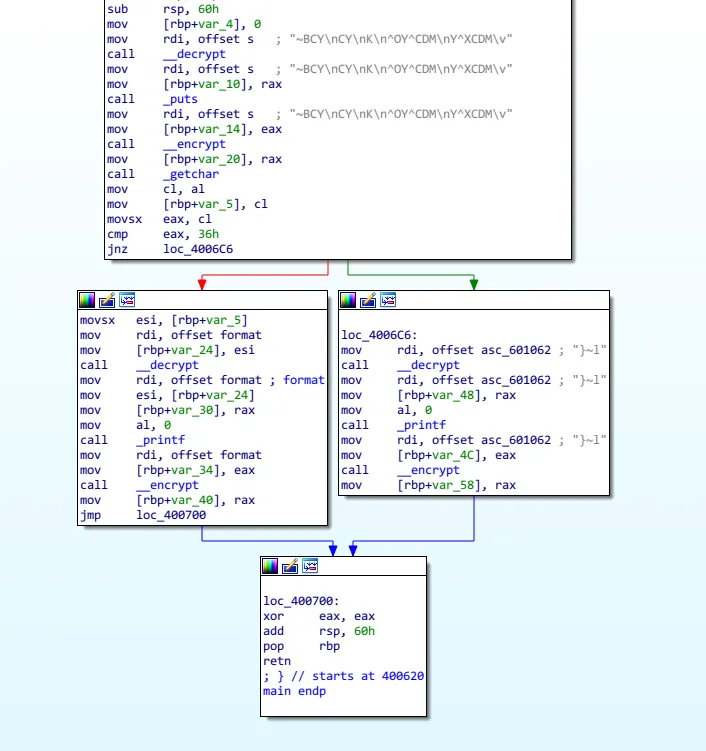使用 LLVM Pass 实现字符串加密 (二)
代码讲解
基本框架
首先是 include 的头文件,项目里用了 LLVM 自己的 SmallVector,还有 IR 下面的 Function, GlobalVariable, IRBuilder, Instructions,还有些 Pass 必备的一些头文件,raw_ostream 用来调试输出。
#include "llvm/ADT/SmallVector.h"
#include "llvm/IR/Function.h"
#include "llvm/IR/GlobalVariable.h"
#include "llvm/IR/IRBuilder.h"
#include "llvm/IR/InstrTypes.h"
#include "llvm/IR/Instructions.h"
#include "llvm/IR/LegacyPassManager.h"
#include "llvm/Pass.h"
#include "llvm/Support/FormatVariadic.h"
#include "llvm/Support/raw_ostream.h"
#include "llvm/Transforms/IPO/PassManagerBuilder.h"
#include <map>
#include <vector>
然后是 LLVM Pass 的基本框架。这里实现的是 Module Pass,所以这个 Pass 继承于 ModulePass。最后两行代码是用于注册 Pass,注册之后在 opt -load libpass.so -help 就能找到这个 Pass 了。
加密函数只用了简单的 xor 来进行加密。需要注意的是不要把字符串的最后一位 '\0' 给 xor 了。
using namespace llvm;
namespace {
/// encrypt strings with xor.
/// \param s input string for encrypt.
void encrypt(std::string &s) {
for (int i = 0; i < s.length() - 1; i++) {
s[i] ^= 42;
}
}
/// A pass for obfuscating const string in modules.
struct ObfuscatePass : public ModulePass {
static char ID;
ObfuscatePass() : ModulePass(ID) {}
virtual bool runOnModule(Module &M) {
return true;
}
};
} // namespace
char ObfuscatePass::ID = 0;
static RegisterPass<ObfuscatePass> X("obfstr", "obfuscate string");
runOnModule 函数
然后开始讲解具体的代码。下面的代码是在寻找全局变量,并且找到他的使用者。
首先通过 GlobalVariable GVar->users() 来找到使用者。如果使用者不是单独的指令,而是类似 i8* getelementptr ... 这样的语句,则寻找这个语句的使用者。如果发现这个语句只有 CallInst 类型的使用者,且只有一个函数使用了这个常量,则对字符串进行加密,并去除对应字符串的常量属性。
virtual bool runOnModule(Module &M) {
for (GlobalValue &GV : M.globals()) {
GlobalVariable *GVar = dyn_cast<GlobalVariable>(&GV);
if (GVar == nullptr) {
continue;
}
std::vector<std::pair<Instruction *, User *>> Target;
bool hasExceptCallInst = false;
// Find all user and encrypt const value, then insert decrypt function.
for (User *Usr : GVar->users()) {
// Get instruction.
Instruction *Inst = dyn_cast<Instruction>(Usr);
if (Inst == nullptr) {
// If Usr is not an instruction, like i8* getelementptr...
// Dig deeper to find Instruction.
for (User *DirecUsr : Usr->users()) {
Inst = dyn_cast<Instruction>(DirecUsr);
if (Inst == nullptr) {
continue;
}
if (!isa<CallInst>(Inst)) {
hasExceptCallInst = true;
Target.clear();
} else {
Target.emplace_back(std::pair<Instruction *, User *>(Inst, Usr));
}
}
}
}
if (hasExceptCallInst == false && Target.size() == 1) {
for (auto &T: Target) {
obfuscateString(M, T.first, T.second, GVar);
}
// Change constant to variable.
GVar->setConstant(false);
}
}
return true;
}
obfuscateString 函数
函数中主要分为下面三个部分
- 替换字符串为加密字符串
- 创建函数声明
- 创建调用指令
下面是加密字符串常量的语句,这里先将常量转换成 ConstantDataArray,用 getAsString() 提取字符串,最后用加密后的字符串创建 Constant 替换原来字符串。
// Encrypt origin string and replace it encrypted string.
ConstantDataArray *GVarArr =
dyn_cast<ConstantDataArray>(GVar->getInitializer());
if (GVarArr == nullptr) {
continue;
}
std::string Origin;
if (GVarArr->isString(8)) {
Origin = GVarArr->getAsString().str();
} else if (GVarArr->isCString()) {
Origin = GVarArr->getAsCString().str();
}
encrypt(Origin);
Constant *NewConstStr = ConstantDataArray::getString(
GVarArr->getContext(), StringRef(Origin), false);
GVarArr->replaceAllUsesWith(NewConstStr);
然后是使用 IRBuilder 创建相关语句和函数调用。首先通过 getOrInsertFunction 插入或获取函数,然后使用 builder.CreateCall(); 语句创建调用解密和加密函数的指令。
由于调用顺序是 解密字符串函数 -> 使用字符串函数 -> 加密字符串函数,加密函数得插入使用指令的后方,而不是和 IRBuilder 创建的指令一样待在使用指令的前方。所以这里不使用 IRBuilder 创建指令,而是手动创建指令 + 手动插入。
// Insert decrypt function above Inst with IRBuilder.
IRBuilder<> builder(Inst);
Type *Int8PtrTy = builder.getInt8PtrTy();
// Create decrypt function in GlobalValue / Get decrypt function.
SmallVector<Type *, 1> FuncArgs = {Int8PtrTy};
FunctionType *FuncType = FunctionType::get(Int8PtrTy, FuncArgs, false);
Constant *DecryptFunc = M.getOrInsertFunction("__decrypt", FuncType);
Constant *EncryptFunc = M.getOrInsertFunction("__encrypt", FuncType);
// Create call instrucions.
SmallVector<Value *, 1> CallArgs = {Usr};
CallInst *DecryptInst = builder.CreateCall(FuncType, DecryptFunc, CallArgs);
CallInst *EncryptInst = CallInst::Create(FuncType, EncryptFunc, CallArgs);
EncryptInst->insertAfter(Inst);
__encrypt 和 __decrypt 函数
由于只是 xor,所以函数的代码很相似。
char *__decrypt(char *encStr) {
char *curr = encStr;
while (*curr) {
*curr ^= 42;
curr++;
}
return encStr;
}
char *__encrypt(char *originStr) {
char *curr = originStr;
while (*curr) {
*curr ^= 42;
curr++;
}
return originStr;
}Pass 的简单使用
首先将需要加密的文件和含有加密函数的文件编译成后缀为 .ll 的 LLVM IR 形式,然后使用 opt 来对需要加密的文件进行加密,最后则是将含有加密函数的文件和需要加密的文件进行链接,生成二进制文件。
将下面的脚本保存为 "run.sh" 后,就可以使用 bash run.sh test.c 来编译程序了。
fullname=${1}
basename=${fullname/.c/}
clang-8 -emit-llvm -S ${fullname} -o ${basename}.ll
clang-8 -emit-llvm -S encrypt.c -o encrypt.ll
opt-8 -p \
-load ../build/obfuscate/libobfuscate.so \
-obfstr ${basename}.ll \
-o ${basename}_out.bc
llvm-link-8 encrypt.ll ${basename}_out.bc -o final.bc
clang-8 final.bc -o final.out
混淆效果
下面是测试程序的代码。
#include <stdio.h>
int main() {
puts("This is a testing string!");
char ch;
if ((ch = getchar()) == '6') {
printf("6666%c\n", ch);
} else {
printf("WTF?!\n");
}
return 0;
}下面是使用 clang-8 -emit-llvm -S test.c -o test.ll 直接编译出的 IR。
@.str = private unnamed_addr constant [26 x i8] c"This is a testing string!\00", align 1
@.str.1 = private unnamed_addr constant [8 x i8] c"6666%c\0A\00", align 1
@.str.2 = private unnamed_addr constant [7 x i8] c"WTF?!\0A\00", align 1
; Function Attrs: noinline nounwind optnone uwtable
define dso_local i32 @main() #0 {
%1 = alloca i32, align 4
%2 = alloca i8, align 1
store i32 0, i32* %1, align 4
%3 = call i32 @puts(i8* getelementptr inbounds ([26 x i8], [26 x i8]* @.str, i32 0, i32 0))
%4 = call i32 @getchar()
%5 = trunc i32 %4 to i8
store i8 %5, i8* %2, align 1
%6 = sext i8 %5 to i32
%7 = icmp eq i32 %6, 54
br i1 %7, label %8, label %12
; <label>:8: ; preds = %0
%9 = load i8, i8* %2, align 1
%10 = sext i8 %9 to i32
%11 = call i32 (i8*, ...) @printf(i8* getelementptr inbounds ([8 x i8], [8 x i8]* @.str.1, i32 0, i32 0), i32 %10)
br label %14
; <label>:12: ; preds = %0
%13 = call i32 (i8*, ...) @printf(i8* getelementptr inbounds ([7 x i8], [7 x i8]* @.str.2, i32 0, i32 0))
br label %14
; <label>:14: ; preds = %12, %8
ret i32 0
}下面是使用 opt-8 -p -load ../build/obfuscate/libobfuscate.so -obfstr test.ll -o test.bc 调用 Pass 得到的混淆过的 IR,可以发现字符串已经被混淆成功了。
@.str = private unnamed_addr global [26 x i8] c"~BCY\0ACY\0AK\0A^OY^CDM\0AY^XCDM\0B\00", align 1
@.str.1 = private unnamed_addr global [8 x i8] c"\1C\1C\1C\1C\0FI \00", align 1
@.str.2 = private unnamed_addr global [7 x i8] c"}~l\15\0B \00", align 1
; Function Attrs: noinline nounwind optnone uwtable
define dso_local i32 @main() #0 {
%1 = alloca i32, align 4
%2 = alloca i8, align 1
store i32 0, i32* %1, align 4
%3 = call i8* @__decrypt(i8* getelementptr inbounds ([26 x i8], [26 x i8]* @.str, i32 0, i32 0))
%4 = call i32 @puts(i8* getelementptr inbounds ([26 x i8], [26 x i8]* @.str, i32 0, i32 0))
%5 = call i8* @__encrypt(i8* getelementptr inbounds ([26 x i8], [26 x i8]* @.str, i32 0, i32 0))
%6 = call i32 @getchar()
%7 = trunc i32 %6 to i8
store i8 %7, i8* %2, align 1
%8 = sext i8 %7 to i32
%9 = icmp eq i32 %8, 54
br i1 %9, label %10, label %16
; <label>:10: ; preds = %0
%11 = load i8, i8* %2, align 1
%12 = sext i8 %11 to i32
%13 = call i8* @__decrypt(i8* getelementptr inbounds ([8 x i8], [8 x i8]* @.str.1, i32 0, i32 0))
%14 = call i32 (i8*, ...) @printf(i8* getelementptr inbounds ([8 x i8], [8 x i8]* @.str.1, i32 0, i32 0), i32 %12)
%15 = call i8* @__encrypt(i8* getelementptr inbounds ([8 x i8], [8 x i8]* @.str.1, i32 0, i32 0))
br label %20
; <label>:16: ; preds = %0
%17 = call i8* @__decrypt(i8* getelementptr inbounds ([7 x i8], [7 x i8]* @.str.2, i32 0, i32 0))
%18 = call i32 (i8*, ...) @printf(i8* getelementptr inbounds ([7 x i8], [7 x i8]* @.str.2, i32 0, i32 0))
%19 = call i8* @__encrypt(i8* getelementptr inbounds ([7 x i8], [7 x i8]* @.str.2, i32 0, i32 0))
br label %20
; <label>:20: ; preds = %16, %10
ret i32 0
}在 IDA 中也可以看到混淆的效果。

完整代码
obfuscate.cpp
//===-- obfuscate/obfuscate.cpp - main file of obfuscate_string -*- C++ -*-===//
//
// The main file of the obfusate_string pass.
// LLVM project is under the Apache License v2.0 with LLVM Exceptions.
// See https://llvm.org/LICENSE.txt for license information.
// SPDX-License-Identifier: Apache-2.0 WITH LLVM-exception
//
//===----------------------------------------------------------------------===//
///
/// \file
/// This file contains the module pass class and decrypt function.
///
//===----------------------------------------------------------------------===//
#include "llvm/ADT/SmallVector.h"
#include "llvm/IR/Function.h"
#include "llvm/IR/GlobalVariable.h"
#include "llvm/IR/IRBuilder.h"
#include "llvm/IR/InstrTypes.h"
#include "llvm/IR/Instructions.h"
#include "llvm/IR/LegacyPassManager.h"
#include "llvm/Pass.h"
#include "llvm/Support/FormatVariadic.h"
#include "llvm/Support/raw_ostream.h"
#include "llvm/Transforms/IPO/PassManagerBuilder.h"
#include <map>
#include <vector>
using namespace llvm;
namespace {
/// encrypt strings with xor.
/// \param s input string for encrypt.
void encrypt(std::string &s) {
for (int i = 0; i < s.length() - 1; i++) {
s[i] ^= 42;
}
}
/// A pass for obfuscating const string in modules.
struct ObfuscatePass : public ModulePass {
static char ID;
ObfuscatePass() : ModulePass(ID) {}
virtual bool runOnModule(Module &M) {
for (GlobalValue &GV : M.globals()) {
GlobalVariable *GVar = dyn_cast<GlobalVariable>(&GV);
if (GVar == nullptr) {
continue;
}
std::vector<std::pair<Instruction *, User *>> Target;
bool hasExceptCallInst = false;
// Find all user and encrypt const value, then insert decrypt function.
for (User *Usr : GVar->users()) {
// Get instruction.
Instruction *Inst = dyn_cast<Instruction>(Usr);
if (Inst == nullptr) {
// If Usr is not an instruction, like i8* getelementptr...
// Dig deeper to find Instruction.
for (User *DirecUsr : Usr->users()) {
Inst = dyn_cast<Instruction>(DirecUsr);
if (Inst == nullptr) {
continue;
}
if (!isa<CallInst>(Inst)) {
hasExceptCallInst = true;
Target.clear();
} else {
Target.emplace_back(std::pair<Instruction *, User *>(Inst, Usr));
}
}
}
}
if (hasExceptCallInst == false && Target.size() == 1) {
for (auto &T: Target) {
obfuscateString(M, T.first, T.second, GVar);
}
// Change constant to variable.
GVar->setConstant(false);
}
}
return true;
}
/// Obfuscate string and add decrypt function.
/// \param M Module
/// \param Inst Instruction
/// \param Usr User of the \p GlobalVariable
/// \param GVar The const string
void obfuscateString(Module &M, Instruction *Inst, Value *Usr,
GlobalVariable *GVar) {
// Encrypt origin string and replace it encrypted string.
ConstantDataArray *GVarArr =
dyn_cast<ConstantDataArray>(GVar->getInitializer());
if (GVarArr == nullptr) {
return;
}
std::string Origin;
if (GVarArr->isString(8)) {
Origin = GVarArr->getAsString().str();
} else if (GVarArr->isCString()) {
Origin = GVarArr->getAsCString().str();
}
encrypt(Origin);
Constant *NewConstStr = ConstantDataArray::getString(
GVarArr->getContext(), StringRef(Origin), false);
GVarArr->replaceAllUsesWith(NewConstStr);
// Insert decrypt function above Inst with IRBuilder.
IRBuilder<> builder(Inst);
Type *Int8PtrTy = builder.getInt8PtrTy();
// Create decrypt function in GlobalValue / Get decrypt function.
SmallVector<Type *, 1> FuncArgs = {Int8PtrTy};
FunctionType *FuncType = FunctionType::get(Int8PtrTy, FuncArgs, false);
Constant *DecryptFunc = M.getOrInsertFunction("__decrypt", FuncType);
// Create call instrucions.
SmallVector<Value *, 1> CallArgs = {Usr};
CallInst *DecryptInst = builder.CreateCall(FuncType, DecryptFunc, CallArgs);
Constant *EncryptFunc = M.getOrInsertFunction("__encrypt", FuncType);
CallInst *EncryptInst = CallInst::Create(FuncType, EncryptFunc, CallArgs);
EncryptInst->insertAfter(Inst);
}
};
} // namespace
char ObfuscatePass::ID = 0;
static RegisterPass<ObfuscatePass> X("obfstr", "obfuscate string");
encrypt.c
char *__decrypt(char *encStr) {
char *curr = encStr;
while (*curr) {
*curr ^= 42;
curr++;
}
return encStr;
}
char *__encrypt(char *originStr) {
char *curr = originStr;
while (*curr) {
*curr ^= 42;
curr++;
}
return originStr;
}网站声明:如果转载,请联系本站管理员。否则一切后果自行承担。
- 上周热门
- WPS City Talk · 校招西安站来了! 3767
- 服贸会|范渊荣获年度创新领军人物!王欣分享安恒信息“AI+安全”探索 3693
- 有在找工作的IT人吗? 3655
- 字节跳动“安全范儿”高校挑战赛来袭!三大赛道,赢 80 万专项基金! 3615
- 阿B秋招线下宣讲行程来啦,速速报名! 3609
- 字节跳动校招 | 电商业务 2025 校园招聘进行中!五大职类热招,等你来投! 3601
- 麒麟天御安全域管平台升级!为企业管理保驾护航 3585
- 烽火通信2025届校园招聘宣讲行程发布!! 3421
- 2024海洋能源产业融合发展论坛暨博览会同期活动-海洋能源与数字化智能化论坛成功举办 3382
- 华为全联接大会2024丨软通动力分论坛精彩议程抢先看! 3356
- 本周热议
- 我的信创开放社区兼职赚钱历程 40
- 今天你签到了吗? 27
- 如何玩转信创开放社区—从小白进阶到专家 15
- 信创开放社区邀请他人注册的具体步骤如下 15
- 方德桌面操作系统 14
- 我有15积分有什么用? 13
- 用抖音玩法闯信创开放社区——用平台宣传企业产品服务 13
- 如何让你先人一步获得悬赏问题信息?(创作者必看) 12
- 2024中国信创产业发展大会暨中国信息科技创新与应用博览会 9
- 中央国家机关政府采购中心:应当将CPU、操作系统符合安全可靠测评要求纳入采购需求 8


